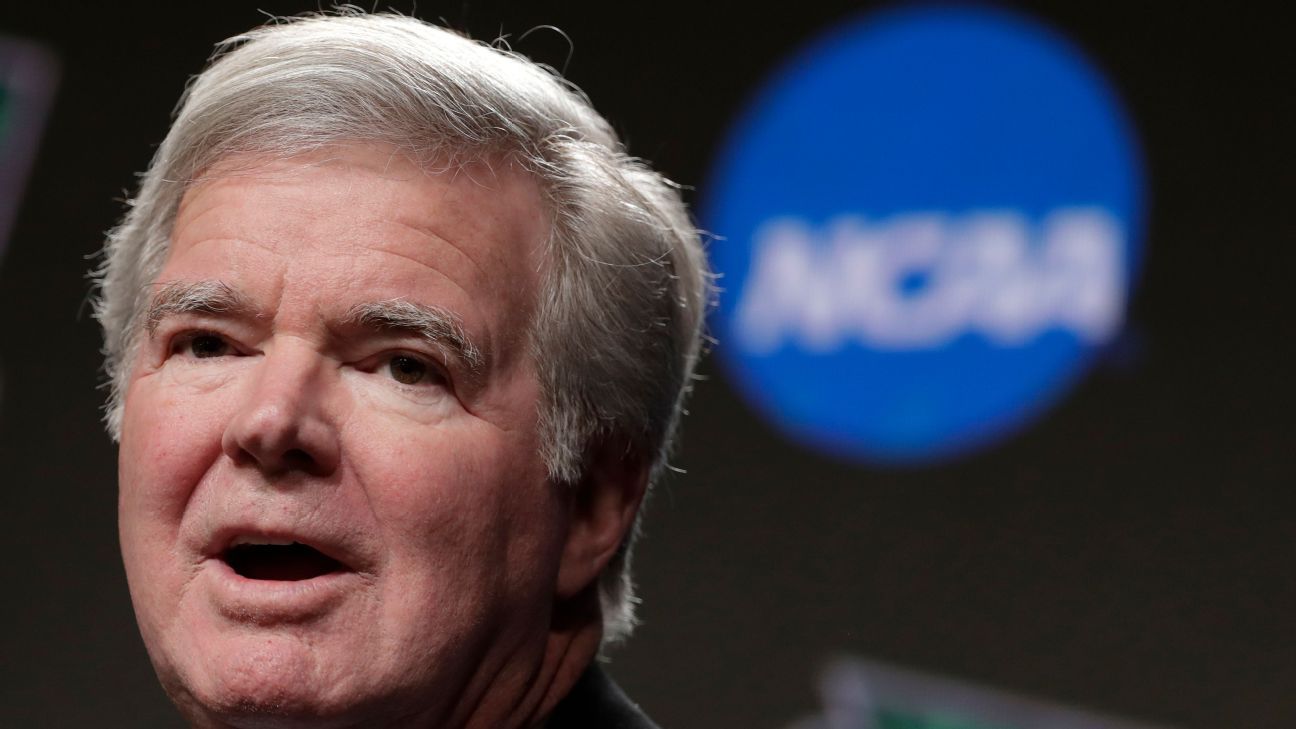NCAA president Mark Emmert said he “couldn’t disagree more” with a proposal that the association should part ways with the most lucrative sports under its purview in an effort to preserve the education-based model of sports it espouses.
Emmert delivered his annual state-of-the-union style address Tuesday afternoon at the NCAA convention, which is being held virtually because of the coronavirus pandemic.
The 10-minute speech outlined his prescribed approach to some of the most pressing challenges the NCAA faces in what he deemed a “seminal year” for the century-old association. He said that while it would be naïve to ignore the “enormous amount of revenue” generated by sports such as FBS football and basketball, his hope is that the member schools that make up the NCAA will focus on spending that money in a way that prioritizes the needs of college athletes.
The NCAA has come under increased pressure from lawmakers and others who believe it’s unfair for coaches and administrators to grow rich in a multibillion-dollar industry while athletes are not allowed to share in those profits due to amateurism rules.
The Knight Commission, a reformed-minded nonprofit group that studies college sports, suggested late last year that the best way to preserve amateur sports at the college level was for schools to remove FBS football — the entity that generates the most money and operates most like a business — from its counterparts.
Emmert said such a move would be treating football like a “pure entertainment industry with paid professionals,” a model to which he objects.
“One of the big issues for me, and I know for you, isn’t whether or not sports produce big revenue, it’s what do we do with the revenue?” he said. “Do we line it up with what we care about? Do we spend those dollars on the things that matter the most for the young men and women who play these games?”
Emmert’s comments come at the end of a year in which the salaries of coaches and administrators continued to increase despite athletic departments facing massive budget shortfalls due to the pandemic. On Monday night, Alabama’s Nick Saban became the first college football coach to earn more than $10 million in a year after counting for the bonus he receives for leading his Crimson Tide to a national championship.
Also on Monday, the NCAA’s Division I Council decided to delay a long-awaited vote to change the rules that currently prevent athletes from accepting endorsement money while in school.
Emmert said he was “frustrated and disappointed” that the vote on name, image and likeness (NIL) rules was delayed. The NCAA’s board of directors made a commitment in 2019 to modernize those rules by no later than January 2021. Emmert said last-minute complications — namely a letter from the leader of the Department of Justice’s antitrust division expressing some concern with how the new rules would fit into federal law — make it “ill-advised” to continue with a vote this month.
Emmert said the NCAA remains determined to pass NIL rules and a rule that would make it easier for some athletes to transfer schools without punishment as soon as possible. He didn’t provide any kind of timeline for when that might happen, and multiple sources told ESPN that no revised timeline was discussed in the Division I Council’s meeting Monday.
“We promised this to our students. We’re going to get it done,” Emmert said. “It’s going to take a little bit longer than we anticipated, there’s no question of that. We’re going to do it in a way that is consistent with all the laws that are applicable to the NCAA. We think we’ve done that already. We think we have it right. But it’s been called into question and so now we need to pause to answer those questions.”
While passing the NIL rule is a top priority, Emmert said the NCAA has “a lot of unfinished business” to accomplish in 2021. Other priorities include increasing diversity among the men and women who hold administrative positions and coaching positions in college sports. Emmert said “the numbers are not good today.”
He also said it’s important that the NCAA makes sure its enforcement system provides real consequences for those who violate NCAA rules, but does it in a way that doesn’t harm the innocent.
“We know that we can do better than we do right now,” Emmert said.
